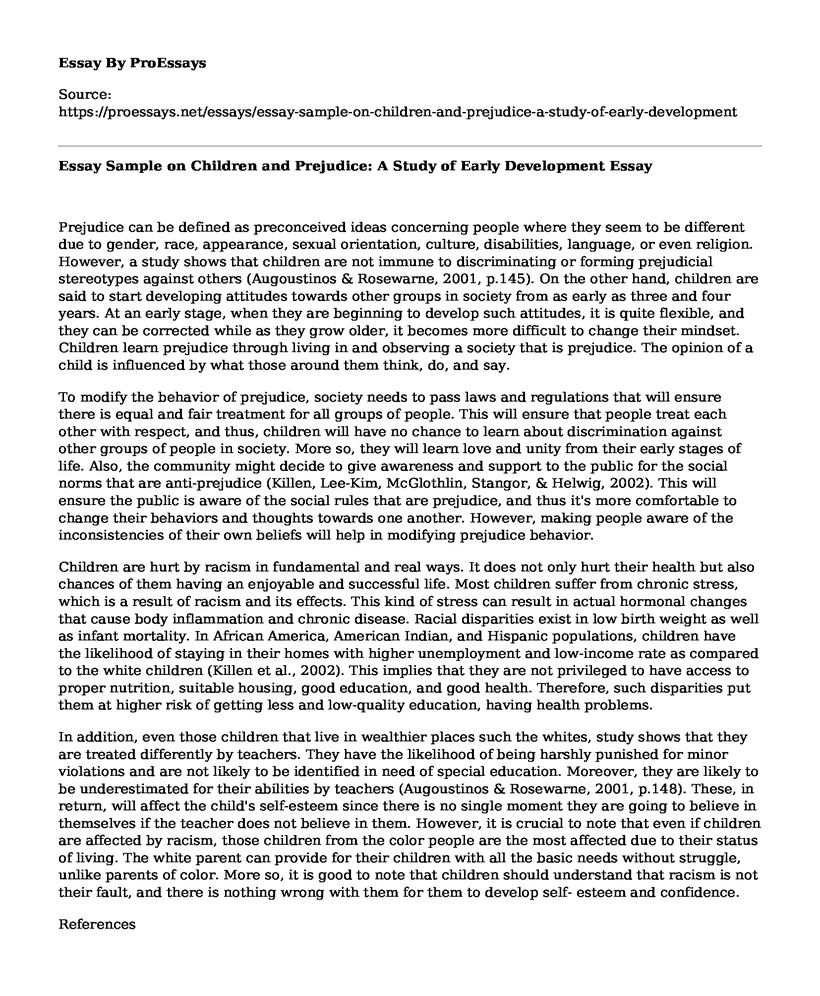Prejudice can be defined as preconceived ideas concerning people where they seem to be different due to gender, race, appearance, sexual orientation, culture, disabilities, language, or even religion. However, a study shows that children are not immune to discriminating or forming prejudicial stereotypes against others (Augoustinos & Rosewarne, 2001, p.145). On the other hand, children are said to start developing attitudes towards other groups in society from as early as three and four years. At an early stage, when they are beginning to develop such attitudes, it is quite flexible, and they can be corrected while as they grow older, it becomes more difficult to change their mindset. Children learn prejudice through living in and observing a society that is prejudice. The opinion of a child is influenced by what those around them think, do, and say.
To modify the behavior of prejudice, society needs to pass laws and regulations that will ensure there is equal and fair treatment for all groups of people. This will ensure that people treat each other with respect, and thus, children will have no chance to learn about discrimination against other groups of people in society. More so, they will learn love and unity from their early stages of life. Also, the community might decide to give awareness and support to the public for the social norms that are anti-prejudice (Killen, Lee-Kim, McGlothlin, Stangor, & Helwig, 2002). This will ensure the public is aware of the social rules that are prejudice, and thus it's more comfortable to change their behaviors and thoughts towards one another. However, making people aware of the inconsistencies of their own beliefs will help in modifying prejudice behavior.
Children are hurt by racism in fundamental and real ways. It does not only hurt their health but also chances of them having an enjoyable and successful life. Most children suffer from chronic stress, which is a result of racism and its effects. This kind of stress can result in actual hormonal changes that cause body inflammation and chronic disease. Racial disparities exist in low birth weight as well as infant mortality. In African America, American Indian, and Hispanic populations, children have the likelihood of staying in their homes with higher unemployment and low-income rate as compared to the white children (Killen et al., 2002). This implies that they are not privileged to have access to proper nutrition, suitable housing, good education, and good health. Therefore, such disparities put them at higher risk of getting less and low-quality education, having health problems.
In addition, even those children that live in wealthier places such the whites, study shows that they are treated differently by teachers. They have the likelihood of being harshly punished for minor violations and are not likely to be identified in need of special education. Moreover, they are likely to be underestimated for their abilities by teachers (Augoustinos & Rosewarne, 2001, p.148). These, in return, will affect the child's self-esteem since there is no single moment they are going to believe in themselves if the teacher does not believe in them. However, it is crucial to note that even if children are affected by racism, those children from the color people are the most affected due to their status of living. The white parent can provide for their children with all the basic needs without struggle, unlike parents of color. More so, it is good to note that children should understand that racism is not their fault, and there is nothing wrong with them for them to develop self- esteem and confidence.
References
Augoustinos, M., & Rosewarne, D. L. (2001). Stereotype knowledge and prejudice in children. British Journal of Developmental Psychology, 19(1), 143-156.
Killen, M., Lee-Kim, J., McGlothlin, H., Stangor, C., & Helwig, C. C. (2002). How children and adolescents evaluate gender and racial exclusion. Monographs of the society for research in child development, i-129.
Cite this page
Essay Sample on Children and Prejudice: A Study of Early Development. (2023, Mar 14). Retrieved from https://proessays.net/essays/essay-sample-on-children-and-prejudice-a-study-of-early-development
If you are the original author of this essay and no longer wish to have it published on the ProEssays website, please click below to request its removal:
- Essay Sample on Racial Divide in United States
- Paper Example on Work-Related Challenges: Think and Problem Solving
- Follow Your Dreams or to Investigate the Job Market When Choosing a Profession Essay
- Essay on Positive Teacher-Student Relationships: Conceptualization and Methods
- Essay on Creating Meaningful Communication: Establishing Effective Communication Policies
- Essay Example on Beliefs: Essential for Knowledge, Despite Background
- Essay Sample on Workaholism in College: How to Avoid its Lasting Effects







